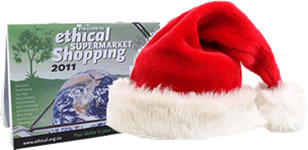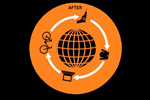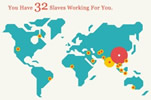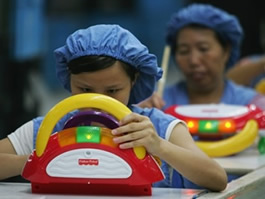|
Update. farewell October 2011 Collaborative Consumption ... Slavery Footprint ... Organics ... Pulpwatch ... Toys & China |
Here’s a slightly belated October update - somewhat late as we’ve been working to complete the 2012 edition of our Guide to Ethical Supermarket Shopping. It’s almost here, ready for Christmas, with fully updated company assessments, and special features on toys, cosmetics, meat, and beer. You can pre-order it online. See an excerpt on toys from the new guide below.
Great gifts - discount guides ...
In anticipation of the mid-November release of the 2012 edition of the Guide to Ethical Supermarket Shopping, we have drastically reduced the prices on the 2011 edition. Our SHOP
page has plenty of other goodies to help you match your purchases
with your values. www.ethical.org.au/shop |
What's mine is yours...
| Would
you trust a stranger to drive your car, or sleep in your house?
Thousands of people say 'yes' they would. They're part of the collaborative
consumption movement, named by Time magazine as one of the top
10 trends to watch. It's all about doing some very old fashioned
things like swap, barter, and trade but using social technologies
to do it. eBay, Craigslist, Zopa, CouchSurfing, Airbnb, Zipcar,
RelayRides. It's happening on a scale never seen before. Collaborative
Consumption is reinventing not just what people consume but how
they consume it. More |
How many slaves work for you?...
|
A few hundred years ago, it was easy to determine one’s slavery
footprint: step out on the porch and count the laborers. Today,
millions of slaves make your clothes, food and electronics, but
they are hidden halfway around the world: Uzbek children pick cotton
for your shirts, Brazilian men harvest your sugar cane, and Congolese
boys mine the raw materials that end up in your smartphone. Check
out Slavery
Footprint which looks at the products you own and the regions
where forced labor was employed in their production. |
Why Organic?...
What is the difference between organic and non-organic honey? Milk?
Meat? Clothing? The answers all lie within the newly launched free,
downloadable consumer guide to the Australian Certified Organic Standard.
The Standard is the most widely used in Australia encompassing the
rules which apply to organic operators using the recognisable Australian
Certified Organic logo, among others. Download
the guide. More
on organic. |
Pulpwatch.org
| For
those who want to know a little more about the story behind your paper.
Pulpwatch reveals the good, the bad, and the ugly in the pulp and
paper industry. Pulpwatch.org
is a map-driven interface that shows the best and worst mills in the
world, with each assigned a rating in the areas of Forestry certification,
Bleaching technology, Endangered forest, and Social conflicts. Check
out how Australian Paper (maker of Reflex) go. |
Focus on 'Toys & China' ...
(excerpt from 2012 Guide to Ethical Supermarket Shopping).
Many toys are produced in factories operating under sweatshop-like conditions. Despite protests, the industry continues to source toys from factories with documented labour and human rights violations.
|
|
Three-quarters of the world’s toys are made in China. Working conditions have been improving, but serious labour violations continue. Toy workers have to work long days in the peak season without appropriate pay — often for more than 80 hours a week — well above China’s legal limit. Many factories impose fines for refusing and other misdemeanours’, such as missing a day’s work or spending too long on a toilet break. chinalaborwatch.org The
ICTI CARE Process is the toy industry’s ethical manufacturing
program aimed at ensuring safe and humane workplace environments
for toy factory |
What
can you do? |
|
Find good food - close to you! ...
| Our
new project – Local
Harvest – is due for launch in February next year. It’s a great
new resource for making local food choices beyond the supermarket.
It includes a national directory for finding food co-ops, food swap
meets, community gardens, farmers markets, box systems, pick-you-own
farms and more. You'll be able to connect with growers as well as
exploring DIY alternatives for food production in an urban setting.
We're looking for people to be involved by helping out or spreading
the word. Find out more at localharvest.org.au. |
Get the Guide!
- pocket guide, iphone app, hemp bags - www.ethical.org.au/shop
See news and print guide updates at www.ethical.org.au/news
and www.ethical.org.au/rss
Follow us on Twitter www.twitter.com/ethicalshopper
& Facebook www.facebook.com/ethicalshopper
To view this newsletter online go to www.ethical.org.au/newsletters/oct2011.htm






